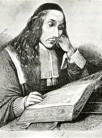Spinoza - The Reign of Law
[Giordano] Bruno lived after the Copernican but before the Cartesian revolution, when men could still find even an infinite universe pulsating with life. Spinoza too knew that the universe is without limit, but he knew also that that universe displays not life but the reign of inexorable mechanical law. Spinoza was a learned Jew of Amsterdam who lived an uneventful life amidst these startling intellectual changes. Outwardly he was but a poor lens-grinder, supporting himself by his labors and indulging much in study; but beneath this monotonous exterior there burned an inward glory, the calm clear light of the mind that looked upon the very face of God.
For Spinoza the end of knowledge was just what it had been for Aquinas, the contemplation of that truth which is the origin of all truth. But though the problems he solved for himself were the highest problems of the scholastic wisdom, the solutions were those of one who had grasped and thoroughly understood the significance of the seventeenth-century mathematical world. His intensely religious nature sought that to which he might wholly abandon himself, and in the religion of science he found what for him was God. Not even Calvin had a keener sense of the glory and joy of absolute devotion and selfless resignation to the power and order of the universe.
The Cartesian world had exempted two things from its all-embracing mechanical sweep, God the creator, and the soul of man. For Spinoza the latter was as much a part of immutable order as anything else, and God was nothing other than that order itself. “By God we mean a being supremely perfect and absolutely infinite”; then so far as man’s mind can penetrate his being, he must be the great order of the universe, the order of mathematical law. From this being flow laws and events, facts and objects, as the properties of a triangle flow from its nature…
This, indeed, is but carrying out the logical consequences of the new science. But Spinoza cannot stop here. What becomes of the God in whose image man was made? Away with such petty human imaginings!
"Moreover, I will show.., that neither intellect nor will appertain to God’s nature.... If intellect and will appertain to the eternal essence of God, we must take these words in some significations quite different from those they usually bear. For an intellect and a will which would constitute the essence of God would perforce be as far apart as the poles from the human intellect and will, in fact, would have nothing in common with them but the name; there would be about as much correspondence between the two as there is between the Dog, the heavenly constellation, and the dog, an animal that barks."
Gone is the wise and loving Father, to whom man can appeal in prayer; irretrievably gone is the great Friend behind the world who cares.
The scene of human life is an infinite immutable order.
"Nothing comes to pass in nature in contravention to her universal laws, nay, everything agrees with them and follows from them, for whatsoever comes to pass, comes to pass by the will and eternal decree of God; that is, whatever comes to pass comes to pass according to laws and rules which involve eternal necessity and truth; nature, therefore, always observes laws and rules which involve eternal necessity and truth, although they may not all be known to us, and therefore she keeps a fixed and immutable order"
Gone is every vestige of purpose and final cause…
We cannot touch on the further doctrine of this mighty intellect; indeed, he was a hundred years ahead of his time in seeing so clearly as he did what the Cartesian revolution had really done to man and his world. And by the time men came to understand what he really meant, and their epithets of “hideous atheists’ had given way to warm approval, science was already effecting a further revolution which, if it altered nothing of what we have quoted above, did transform his further conclusions.
Let us take leave of these two titanic revolutions [Bruno’s and Spinoza’s] in men’s beliefs with the calm closing hymn to science, in which Spinoza anticipated the real religion of the next age.
"I have thus completed all I wished to set forth touching the mind’s power over the emotions and the mind’s freedom. Whence it appears, how potent is the wise man, and how much he surpasses the ignorant man, who is driven only by his lusts. For the ignorant man is not only distracted in various ways by external causes without ever gaining the true acquiescence of his spirit, but moreover lives, as it were unwitting of himself, and of God, and of things, and as soon as he ceases to suffer, ceases also to be.
Whereas the wise man, in so far as he is regarded as such, is scarcely at all disturbed in spirit, but, being conscious of himself, and of God, and of things, by a certain eternal necessity, never ceases to be, but always possesses true acquiescence of spirit.
If the way which I have pointed out as leading to this result seems exceedingly hard, it may nevertheless be discovered. Needs must it be hard, since it is so seldom found. How would it be possible, if salvation were ready to our hand, and could without great labor be found, that it should be by almost all men neglected? But all things excellent are as difficult as they are rare."


